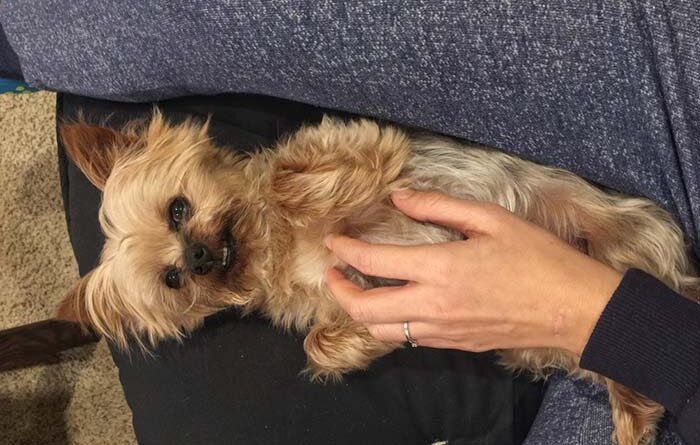4 Reasons Why Your Dog’s Stomach is Hard and What to Do – Top Dog Tips
When your dog’s stomach swells or hardens, there may be a serious cause for concern, or it may just be a case of your dog overeating. It’s important to know the difference between something that can take care of itself versus something that can cause your dog serious harm.
The four main reasons why your dog’s stomach may be hard are: Gastric Dilation Volvulus (GDV), Peritonitis, Cushing’s Syndrome, and Ascites. Of course, there may be a few other reasons, but these are the most likely ones. By knowing the symptoms of stomach problems in dogs you will be able to know what to do in the event of something more serious happening.
Take note that when a dog has stomach swelling, or hardness, your pooch may be in critical condition. Swelling in dogs can be fatal if the situation is not remedied in a timely manner. Take your dog to the veterinarian as soon as you notice stomach swelling. A veterinarian is the best person to diagnose your dog because you do not want to misinterpret their symptoms and cause them more harm.
1. Gastric Dilation Volvulus

GDV occurs if the bloated stomach rotates. The rotating of the stomach will trap the cas in the stomach and cause the blood supply to the stomach to become blocked. Your dog will be in extreme pain if GDV happens.
To treat GDV, get your dog to a veterinarian as soon as possible. This condition requires the stomach to be decompressed. Once the gas has been released from the dog’s stomach and their heart is stable, surgery is typically the next step to correct the problem.
Unfortunately, there is no hard evidence on why GDV occurs, but there are things that will increase your dog’s risk of getting GDV. When a dog eats fast, only has one larger meal per day, or uses a lifted food or water bowl the risk of GDV increases. Other factors for GDV include: the dog’s breed, the dog’s weight, the dog’s age, and the dog’s family history.
Dog breeds with deep chests or dogs who weigh over 100 pounds have a twenty percent higher risk of bloat. Older dogs, between seven and twelve years of age, are at an increased risk. Finally, if a dog has a family history of bloat or GDV, they are at a greater risk, too.
To help prevent canine bloat in your dog ensure that they are eating two small meals each day instead of one large one, do not use a dog food that causes your dog to have excessive gas, and allow them time to digest their food after eating before they play or exercise.
2. Peritonitis
Peritonitis is a serious infection that has been caused by a rupture or puncture to your dog’s stomach. The rupture or puncture is usually a result of ulcers, tumors, or splinters from a bone they ate, among other reasons. Symptoms include severe pain, listlessness, vomiting, and a swollen or hard abdomen. Because of the severity of Peritonitis, the dog may be unwilling to move or go into shock.
Treatment for Peritonitis includes surgery to repair the rupture and removal of the infection, IV fluids, and medication. To help prevent the potential for stomach rupture or puncture do not feed your dogs bones, such as chicken bones, that may splinter when being digested.
3. Cushing’s Syndrome
Cushing’s syndrome, or hyperadrenocorticism, is caused by the excessive production of cortisol, a hormone. In addition to a hardened stomach or pot-belly look, your dog may exhibit other symptoms, including excessive eating, increased drinking, the need to urinate more, abnormal panting, and loss of hair. The cortisol hormone may be overproduced in the pituitary gland, which is the most common cause of Cushing’s syndrome, or there may be an adrenal gland tumor, which is less common.
Treating Cushing’s syndrome is usually taken care of by a new form of medication. The new medication can help to treat both types of Cushing’s syndrome. If the dog has the second, less likely form of Cushing’s, surgery may also be an option in order to remove the tumor from the adrenal gland.
4. Ascites

Because there is such a wide range of conditions that cause Ascites, there is an equally wide variety of treatments. Treatments will depend on the specific diagnosis given by the veterinarian.
Other Causes
Other causes of stomach swelling or hardness in dogs includes excessive gas from the dog eating all of its food too quickly, injury that results in internal bleeding, a blockage in the stomach or intestines, or tumors. In young dogs, roundworm infections can also cause the abdomen to swell. Treatments for each of these varies based on the severity of the issue.
What to Do
If your dog’s stomach becomes hard, swollen, or distended and it is not because they ate their food too quickly, they should be taken to a veterinarian for and examination and treatment immediately. Veterinarians will be able to diagnose the problem by completing a physical exam, running blood tests, completing a urinalysis, or viewing x-rays.

Gastric Dilation Volvulus, Peritonitis, Cushing’s Syndrome, and Ascites are the four main reasons that your dog’s stomach may become hard or swollen. There are a few things that you can do to help prevent bloat, including feeding your dog smaller meal, requiring rest instead of exercise or play after mealtime, and use a gastric-friendly dog food. If your dog’s stomach becomes hard or swollen you need to act fast. Quick diagnosis and treatment can be lifesaving measures for your dog.
READ NEXT: 11 Stomach Problems in Dogs – How to Prevent and Treat Them





indian pharmacies safe https://indianpharmacy.life/# – top 10 online pharmacy in india
super saver pharmacy https://drugsotc.pro/# discount pharmacy online